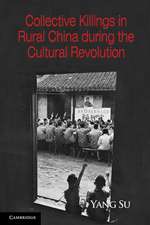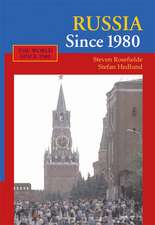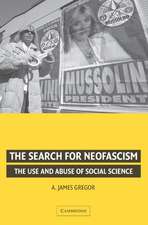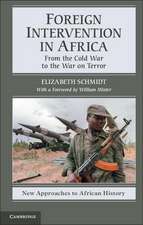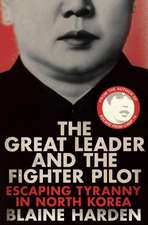The Lost German East: Forced Migration and the Politics of Memory, 1945–1970
Autor Andrew Demshuken Limba Engleză Paperback – 26 feb 2014
| Toate formatele și edițiile | Preț | Express |
|---|---|---|
| Paperback (1) | 339.19 lei 6-8 săpt. | |
| Cambridge University Press – 26 feb 2014 | 339.19 lei 6-8 săpt. | |
| Hardback (1) | 696.80 lei 6-8 săpt. | |
| Cambridge University Press – 29 apr 2012 | 696.80 lei 6-8 săpt. |
Preț: 339.19 lei
Nou
Puncte Express: 509
Preț estimativ în valută:
64.91€ • 67.06$ • 54.02£
64.91€ • 67.06$ • 54.02£
Carte tipărită la comandă
Livrare economică 26 martie-09 aprilie
Preluare comenzi: 021 569.72.76
Specificații
ISBN-13: 9781107634350
ISBN-10: 1107634350
Pagini: 326
Ilustrații: 10 b/w illus. 2 maps
Dimensiuni: 152 x 229 x 19 mm
Greutate: 0.48 kg
Editura: Cambridge University Press
Colecția Cambridge University Press
Locul publicării:New York, United States
ISBN-10: 1107634350
Pagini: 326
Ilustrații: 10 b/w illus. 2 maps
Dimensiuni: 152 x 229 x 19 mm
Greutate: 0.48 kg
Editura: Cambridge University Press
Colecția Cambridge University Press
Locul publicării:New York, United States
Cuprins
1. From colonization to expulsion: a history of the Germans in Silesia; 2. The quest for the borders of 1937: expellee leaders and the 'right to the homeland'; 3. Homesick in the Heimat: Germans in postwar Silesia and the desire for expulsion; 4. Residing in memory: private confrontation with loss; 5. Heimat gatherings: recreating the lost East in West Germany; 6. Travel to the land of memory: homesick tourists in Polish Silesia; 7. 1970 and the expellee contribution to Ostpolitik; Epilogue: 8. The forgotten East.
Recenzii
'The millions of Silesians who fled their homes in the closing months of the Second World War or who were expelled in its aftermath have most often been remembered - if they have been remembered at all in the English-speaking world - as caricatures: symbols of either German victimization or German revanchism. Andrew Demshuk's book is among the first scholarly works to move beyond the statements of official expellee spokesmen and to explore, sympathetically but critically, the complicated processes through which flesh-and-blood individuals gradually came to terms with the loss of the former homeland. His nuanced analysis of this history is an important contribution not only to understanding West German politics and German-Polish relations in the Cold War era, but also to the comparative study of forced migration and its aftermath.' Jim Bjork, King's College London
'Through a careful and perceptive consideration of an impressive amount of evidence, Andrew Demshuk fundamentally reorients the study of the German expellees away from a preoccupation with leaders and movements to a deeper examination of how the expellees themselves understood their experience. Thanks to a focus on memory and not politics, Demshuk demonstrates that the expellees were not a dwindling band of inveterate revanchists, but rather a large and diverse community committed to preserving common images of their past. Persuasively argued and elegantly written, The Lost German East does more than force us to rethink the Silesian German experience; it offers a template for understanding how refugees throughout the world have and can come to terms with their losses.' Benjamin Frommer, Northwestern University
'Demshuk's book brings together a new reading of expellee history in the early years of the Federal Republic … It also makes an important contribution to the wider fields of memory and migration studies. By its unusually close focus upon those expelled from a specific area, The Lost German East produces exactly the kind of detail that challenges simple generalizations and suggests the complexity of these processes. For these reasons this book deserves to be read by all who are interested in the experiences of expellees and of those dislocated by forced migration, as well as by those who seek insights into histories of the integration of migratory populations into new societies.' History
'This very interesting history of Silesian expellees in the Federal Republic of Germany from 1945 to 1970 traces twenty-five years of refugees' constant longing, and charts the changing emotional states that also evolved in that period … The broad variety of sources that the author draws on is admirable: personal interviews by the author and correspondence with expellees about their experience, travel accounts, slide shows, memoirs, advertisements, political speeches, physical monuments, and visual sources … This monograph is clearly written, vigorously argued, and ambitious in its revisions of accepted wisdom. It is a notable contribution to the literature on modern Germany.' Vejas Gabriel Liulevicius, H-German
'… a detailed account of the ways in which expellees from Silesia came to terms with the loss of their Heimat in the years 1945–70 … Demshuk's book provides not only a wealth of exciting findings but also an excellent basis for further discussion. It will surely be of interest to a variety of readers from different backgrounds, and it might help to encourage more research on the role of private life in the history of the Federal Republic of Germany.' Corinna R. Unger, The Journal of Modern History
'Through a careful and perceptive consideration of an impressive amount of evidence, Andrew Demshuk fundamentally reorients the study of the German expellees away from a preoccupation with leaders and movements to a deeper examination of how the expellees themselves understood their experience. Thanks to a focus on memory and not politics, Demshuk demonstrates that the expellees were not a dwindling band of inveterate revanchists, but rather a large and diverse community committed to preserving common images of their past. Persuasively argued and elegantly written, The Lost German East does more than force us to rethink the Silesian German experience; it offers a template for understanding how refugees throughout the world have and can come to terms with their losses.' Benjamin Frommer, Northwestern University
'Demshuk's book brings together a new reading of expellee history in the early years of the Federal Republic … It also makes an important contribution to the wider fields of memory and migration studies. By its unusually close focus upon those expelled from a specific area, The Lost German East produces exactly the kind of detail that challenges simple generalizations and suggests the complexity of these processes. For these reasons this book deserves to be read by all who are interested in the experiences of expellees and of those dislocated by forced migration, as well as by those who seek insights into histories of the integration of migratory populations into new societies.' History
'This very interesting history of Silesian expellees in the Federal Republic of Germany from 1945 to 1970 traces twenty-five years of refugees' constant longing, and charts the changing emotional states that also evolved in that period … The broad variety of sources that the author draws on is admirable: personal interviews by the author and correspondence with expellees about their experience, travel accounts, slide shows, memoirs, advertisements, political speeches, physical monuments, and visual sources … This monograph is clearly written, vigorously argued, and ambitious in its revisions of accepted wisdom. It is a notable contribution to the literature on modern Germany.' Vejas Gabriel Liulevicius, H-German
'… a detailed account of the ways in which expellees from Silesia came to terms with the loss of their Heimat in the years 1945–70 … Demshuk's book provides not only a wealth of exciting findings but also an excellent basis for further discussion. It will surely be of interest to a variety of readers from different backgrounds, and it might help to encourage more research on the role of private life in the history of the Federal Republic of Germany.' Corinna R. Unger, The Journal of Modern History
Descriere
After 1945, Germany was inundated with ethnic German refugees expelled from Eastern Europe. Andrew Demshuk explores why they integrated into West German society.




